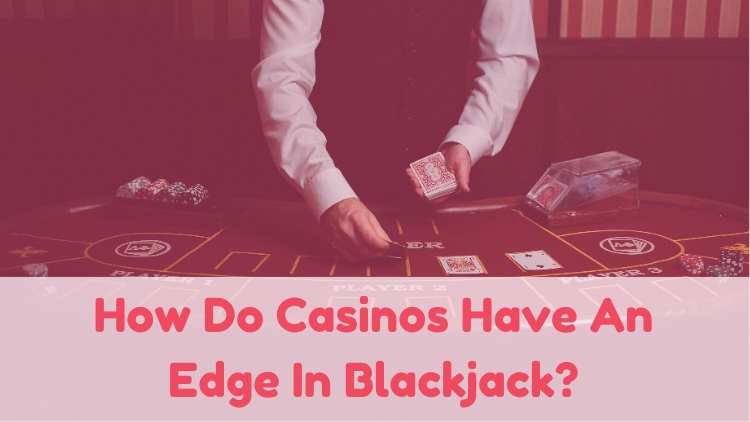
Blackjack is one of the most popular games in the casino world, celebrated for its blend of strategy and chance. But why do casinos always seem to have the upper hand?
If you enjoy playing or watching blackjack, you might have noticed that the dealer often wins. You may even be familiar with the age-old saying: “the house always wins”. Well, it’s not just by chance - casinos have a mathematical advantage known as the "house edge".
In this post, we'll explore how casinos have an advantage in this game, allowing them to profit as a business while also keeping players interested.
Understanding these principles can not only satisfy your curiosity but perhaps even enhance your enjoyment the next time you sit at a blackjack table, as you will have a better understanding of the game by being aware of this aspect of it.
What Gives The Casino The Edge In Blackjack?
In casino games, the house edge is the slight advantage that ensures the casino will make money over time, which means that the casino wins more often than it loses. It is built into the rules of the game, meaning it is not some hidden trick and is easy to spot once you know what you are looking for.
In blackjack, this edge mainly comes from the order in which the game is played. Players take their turns before the dealer does. If a player goes bust by exceeding the total of 21, they lose immediately, even before the dealer plays their hand.
The dealer, on the other hand, only competes against the players who have not gone bust - i.e. are still in the game. If the dealer busts, only those players who are still in the game win the round. Unfortunately, those who went bust earlier do not get to share in the dealer’s failure because they have already lost their bets.
This arrangement - players acting first and losing immediately if they go bust - creates a small but significant advantage for the casino. Understanding this can help players make more informed decisions at the table and approach blackjack with a clearer perspective on the risks involved.
How Do Blackjack Dealers Have An Edge?
The order of play in blackjack gives the dealer a significant edge. Since players make their decisions before the dealer acts, they can lose their bets if they go bust by exceeding 21, regardless of the dealer's outcome.
Players also make their decisions with limited information. You can see your two cards and one of the dealer’s, known as the upcard. This leaves much to guesswork, as the dealer’s second card remains hidden until their turn.
In contrast, the dealer acts with more certainty. By the time it is their turn, they know exactly what hand values they need to beat. This informed play reduces their chances of busting compared to players who must decide with only partial information.
These elements combined give the dealer a consistent advantage over each round, solidifying the casino’s edge. Understanding these factors can provide insight into how the game is structured in favour of the dealer.
Why Does The Casino Have Odds In Blackjack?
The casino’s odds in blackjack come from what’s known as the house edge. This is a built-in statistical advantage that ensures the casino maintains profitability over time.
While players can and do win in the short term - they may even experience a winning streak - the overall design of the game tips the scales slightly in favour of the casino. This is not by a large margin, but even a small advantage can lead to significant profits across thousands of hands played over many tables.
Casinos use this house edge to ensure that, while individual players may win occasionally, the collective outcome over numerous games remains in their favour. Understanding this can help players enjoy the game for what it is: a thrilling mix of chance and skill, but with the knowledge that the odds are ultimately set to favour the house.
Is Blackjack Luck Or Skill?
Blackjack is a fascinating mix of chance and skill. While it is mostly a game of chance, your decisions can significantly affect the outcome.
The element of chance comes from not knowing the dealer’s hole card or what card will be drawn next. These unknowns mean you can never be completely certain of what might happen in each round.
However, skill and strategy play a big role too. By effectively using basic blackjack strategy, a player can reduce the house edge considerably. Without any strategy, the house edge sits at around 2-4%. By utilising basic strategy, this edge can be lowered to about 0.5-1%.
This strategic play involves making the most statistically advantageous decision on whether to hit, stand, split, or double down based on your cards and the dealer’s upcard. While it does not eliminate the house edge completely, it does lower the size of the advantage the casino has.
In essence, blackjack remains a game of chance with an overlay of skill, where informed decisions can lead to better outcomes but chance still plays a significant part.
*All values (Bet Levels, Maximum Wins, etc.) mentioned in relation to this game are subject to change at any time. Game features mentioned may not be available in some jurisdictions.
**The information provided in this blog is intended for educational purposes and should not be construed as betting advice or a guarantee of success. Always gamble responsibly.
